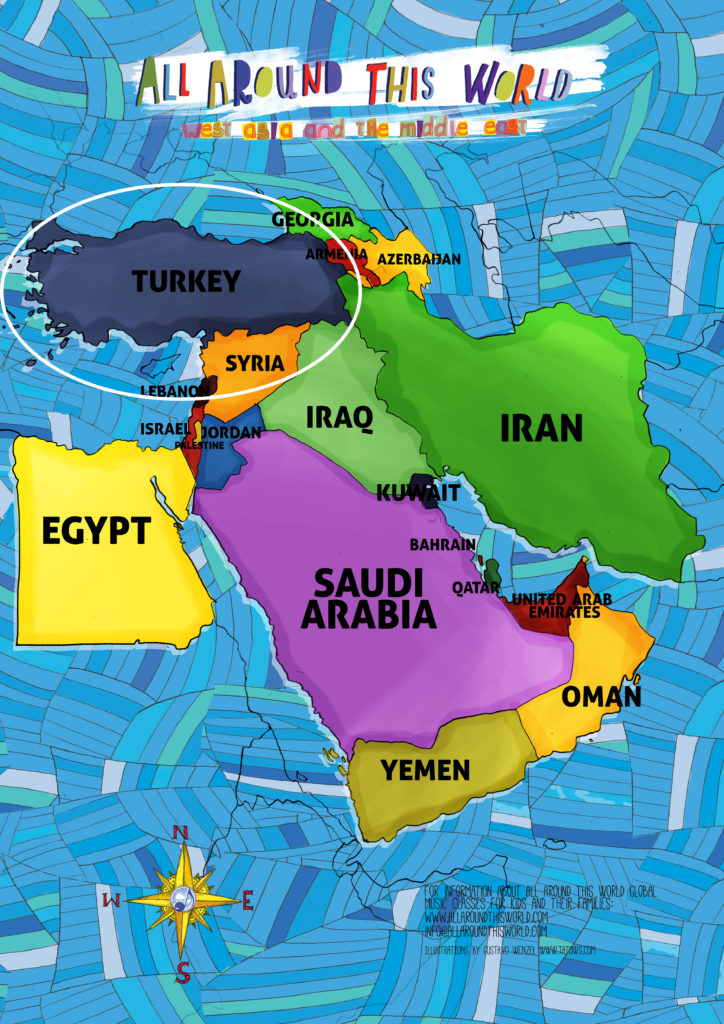Turkish whirling dervishes turn us ’round and and ’round….
We end our week of music from Turkey, this nation that historically has held public secularism so dear, with a religious twist. The Melevia Order of Muslims was founded in Turkey by folloers of 13th century Perisan poet Jalāl ad-Dīn Muhammad Rūmī, also known as “Mevlana Celaleddin-i Rumi.” The Mevlevi are “Sufis” — those who practice a “mystical” Islam. They are more publicly known for their spinning dances, as we see in this video, which they do while engaged in the devotional “dhikr.” The term “whirling dervish” can be used to refer to a member of the Sufi movement, or, more broadly, those who have chosen to devote themselves to spiritual service. In this video we meet the “whirling dervishes” of the Galata Mevlevi House in Istanbul.
Tag Archives | Turkey
Aynur Inspires You to Join the Resistance
Aynur Doğan is a controversial Kurdish singer from Turkey whose “offense,” in the eyes of some Turks, is that she is Turkish but sings songs in the Kurdish language. Born in 1975 in Cemisgezek, a small town in the southeastern mountains of Turkey, Aynur and her family moved to Istanbul to avoid the struggles in their town between the Turkish Army and the Kurdish resistance. The Turkish government’s loosening restrictions on public use of the Kurdish language in 2004 gave Aynur the opportunity to not only perform but to rise to stardom. She has since been an outspoken advocate for the Kurdish people and their right to make art their own language. In this video Aynur Doğan performs “Keçe Kurdan” (“Kurdish Girl”),” from her album of the same name, which a court in southeastern Turkey banned briefly in 2005, fearing that its lyrics would incite Turkish women to abandon their partners and go to the mountains to join the Kurdish resistance.
Orhan Gencebay and…Bubbles?
Orhan Gencebay is one of the giants of the Turkish entertainment industry. In his monumental career Orhan Gencebay has been the lead actor in almost 40 movies, composed an estimated thousand songs and sold over 65 million records — watch this video and you’ll sure get why. Musically, Gencebay pioneered a multifaceted mix of international sounds from Turkey. Wikipedia describes the genre like this: “During the 1970s [Gencebay] released many singles in a new genre that is a fusion of traditional Turkish Folk music, Turkish classical music, Western classical music, jazz, rock, country, progressive, psychedelic, Indian, Arabic, Spanish, and Greek music styles.” Rather than call this new genre “Turko-folko-clasico-jazzy-
rocky-country-prog-psych-Indi-Arab-Spania-Greek” music, musicologists termed it “Arabesque.” Gencebay didn’t like this categorization because it initially implied that he stole his songs from Arabic music he heard on the radio, but the term “Arabesque” has since grown to become synonymous with Turkish music about heartache, longing and even deep suffering. In that way, Arabesque is the Turkish equivalent of the blues.
Turkey — “East Meets West” meets Awesome

This week in our online class we travel to Turkey, where we try to avoid the most simple analysis of the utterly complex nation — that Turkey is a place where “East meets West.” Turkey does claim geography in two continents, but only 3% of the land is in Europe while the rest is in Asia. Most everywhere in Turkey, other than in its main cities, the culture and customs borrow much from Eastern, especially Islamic, influences. Turkey is one of the most consciously secularist states in the world, and while Turkey’s public institutions such its modern constitution functionally separate Church from State, 99% of Turks are Muslim (mostly Sunni). Also, while Turkey has long sought to become a formal part of the European Union, progress toward what is called “accession” is complicated not only by prevailing European powers’ public and private attitudes toward Islam, but also by increasing Turkish skepticism about the motives of the E.U. Turkey is an extraordinary mix of many strains of history, ethnicity, religion and culture, and that makes it an utterly worthwhile place to visit…but simple it is not.
Kids siki siki baba
Berna and Berkan can sure sell a song.
Earlier this week we met the Turkish song “Șiki Șiki Baba,” about a strict dad from Turkey who stands in the way of a budding romance. In this video, two kids, and heckuva band behind them, perform a delightful version. I don’t quite buy the idea that these two have lived through the emotional pain of a romance forbidden by a harsh parent, but they sing their hearts out nonetheless.
Our Strict Turkish Dad
“Șiki Șiki Baba” is a song about a young romance forbidden by a strict, strict father that appears in many iterations in many parts of West Asia and Eastern Europe. There seem to be iterations of the song in many languages, including Arabic and Greek, but our “Șiki Șiki Baba” finds inspiration in the classic version from Turkey. We sing: “If you love me I’ll love you, I will love you all my days, Darling will you love me too?, Our love will find a way….”

